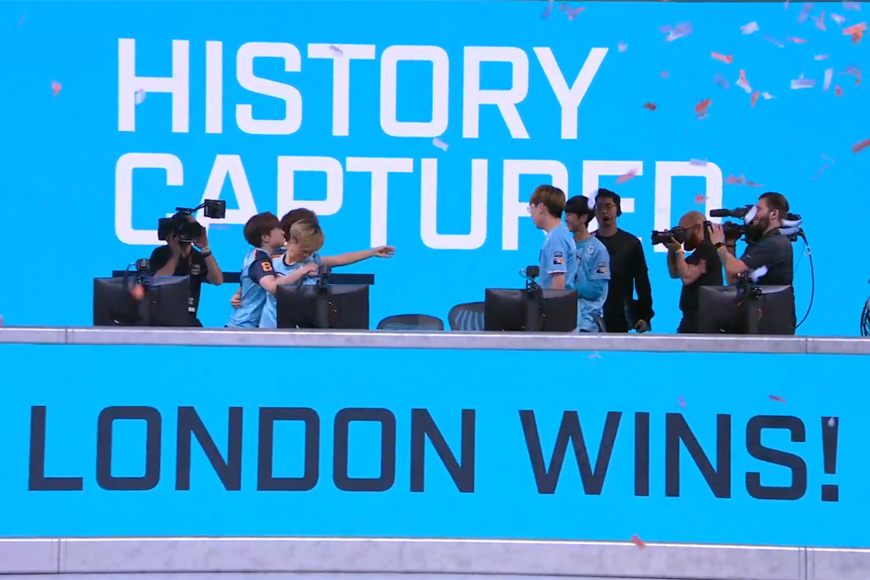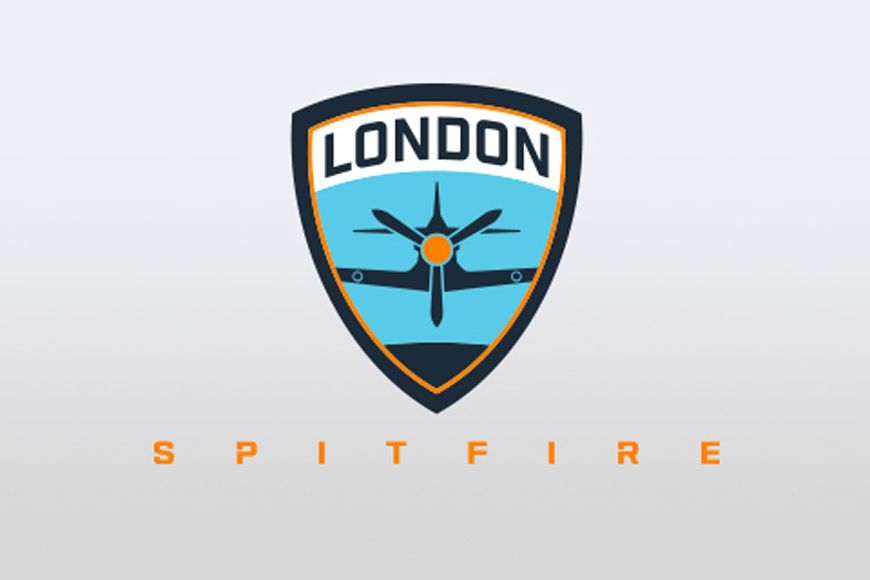Yes they have an all-Korean roster and an American owner, but so what? London Spitfire are Overwatch League Season 1 champions and a boon for UK esports, argues Dom Sacco in this opinion piece.
London Spitfire have captured history – as the image above says – by becoming the Season 1 Overwatch League champions and securing the $1m top prize.
They haven’t always been a dominant force throughout the League, going through highs and lows in terms of performance, but when it counted, they won.
Spitfire swept aside Philadelphia Fusion 3-1 and 3-0 in the grand final this weekend, and that’s all that matters. But let’s go back to the start, and see how Spitfire have developed and impacted since then.
After the Overwatch League was first announced back in November 2016, it sent shockwaves throughout the esports industry, which trickled down into different communities around the world.
Blizzard had decided to go big with this league, announcing plans for a franchising format and teams from around the world taking part. Rumours of franchising spots being priced at around $20m circulated, and some expressed their doubts as to the League’s success.
“British Hurricane and London Spitfire’s wins are fantastic for UK esports. It inspires more players, shows them that it is possible for them to win and gives fans a strong brand to rally behind. It’s great for belief and confidence.”
But the buyers came, and one of them was North American powerhouse Cloud9, who swiftly secured the London slot – much to Fnatic’s ire.
Their brand was to be known as London Spitfire. But criticism continued, this time from pockets of the UK esports community, who weren’t happy that the Spitfire had a lack of a UK presence and an all-Korean roster. But they soldiered on.
British esports veteran Paul “ReDeYe” Chaloner responded to this criticism half a year ago, following his agency Code Red Esports’ appointment to spearhead Spitfire’s operations in the UK.
He spoke about eventually having a home arena where the team will play future Overwatch League matches, practice areas, a retail outlet and fan zones.
Importantly, he addressed the point around a lack of a UK roster.
“It’s true, we have South Koreans in our team!” Paul Chaloner told Esports News UK back in December 2017. “This isn’t a slight on British players, we just went out and got the best damn Overwatch players we could find, regardless of nationality.
“That’s just how any successful team does it. We want to win and we want to win for the city and the country! We want to challenge for that title in the first year and this is the best way to do it.”
And challenge they did. This strategy and vision from Cloud9 and Code Red – and everyone else involved with Spitfire – paid off. For a long time UK esports has been very inward-focused (3/5 players in a UK league must be from the UK, how dare we fly imports over to take part in UK tournaments, etc…)
“We went out and got the best damn Overwatch players we could find, regardless of nationality. We want to win for the city and the country! We want to challenge for that title in the first year and this is the best way to do it.”
Paul Chaloner speaking back in December 2017
Let’s face it, the standard of UK esports players has improved in recent years, but we are still of course far behind other territories like North America, South Korea, other pockets of Europe. So it’s refreshing to see Spitfire look outside to help give the UK a win.
Not only that, but Spitfire set up a separate British Hurricane academy team, consisting of several UK players. And they only went and bloody won the Overwatch Contenders finals, didn’t they.
This is all fantastic for UK esports. It inspires more players, shows them that it is possible for them to win, showcases a path to pro and gives UK esports fans a strong brand to rally behind. It’s great for belief and confidence.
For competitive Overwatch’s London representative to have won both Contenders AND the Overwatch League in the first year is staggering.
Let that sink in for a moment.
A UK brand is dominating in one of the world’s biggest esports.
Pinch us.
Oh, and don’t tell me that Spitfire doesn’t have a UK presence:
ALL THOSE LATE NIGHTS AND 3AM STARTS WERE WORTH IT. CHAMPIONS OF THE OVERWATCH LEAGUE @DRINKRELAXPLAY pic.twitter.com/PsWLCHFZmY
— London Spitfire (@Spitfire) July 28, 2018
Fans gathered for regular viewing parties at London’s Loading Bar, and the crowd were well up for it this weekend as they watched their team win.
This unity and spirit is emblematic of a team and brand that has successfully brought the UK esports/Overwatch community together.
The UK Overwatch Discord is one of the most active UK esports channels I’m a part of, and there is some good UK talent in this space. Not just the competitive players in Hurricane and the likes, but beyond this.
We have UK streamers like Valkia and Stylosa, the latter of which has been working closely with Spitfire for a while now, producing content, tweeting about the team and also previously helping the separate UK Overwatch World Cup team reach the quarter finals in 2017. There’s casters like Jaws and Tridd and Dezachu in Contenders, management including the aforementioned Code Red and others in the community rallying behind competitive Overwatch.
“Let’s not hide in our UK LAN halls or look at the major tournaments around the world like the Overwatch League and think, ‘they’re not for little old us, not for UK esports, we can’t do that’. Let’s aim high.”
There’s been a sense of fun and camaraderie around Spitfire too. From members of the team wearing silly Union Jack hats, to the use of ‘Tally ho!’ in tweets and messaging and even getting the Spitfire players to try out British food for the first time, the UK angle has been evident throughout and has not been taken too seriously.
The Twitter account has had an injenction of British humour – it even tweeted a picture of Harry Redknapp on football transfer deadline day. Someone give whoever runs that account a medal.
Finally, the branding. I’ve touched on it throughout this article, but having ‘London’ in the name and having all that exposure from winning, it puts the UK’s capital front of mind to Overwatch fans, followers of esports and others who might – or might not – be involved with it. It tells the world that London is capable of big things in esports.
This can do nothing but good for UK esports and helping to put us on the map.
Also, merch is now thankfully easier to order from the UK at last.
Even Serena Williams is tweeting about Spitfire’s win, making her followers – many of which may not have a great understanding of esports – more aware.
#AcesHigh#OWL2018 pic.twitter.com/gh7VZWZf78
— Serena Williams (@serenawilliams) July 28, 2018
The Sun, The Daily Mail, Washington Post and CNBC are just a handful of major publications who have already reported on Spitfire’s win.
Esports is hitting the mainstream now. Let’s not hide in our UK LAN halls or look at the major tournaments around the world and think, ‘they’re not for little old us, not for UK esports, we can’t do that’.
Let’s embrace the next-generation of esports and aim high – Spitfire has shown us there is a way for UK esports to reach the big leagues.
And the only way is up.
Must-Read Casino & Betting Guides
Check out our featured gaming guides to find top UK casinos, no verification sites, fast withdrawal platforms, and more.
- Best Online Casinos UK
- Top Crypto Casinos
- UK Sports Betting Sites
- No KYC Casinos UK
- Non Gamstop Casino Sites

Dom is an award-winning writer and finalist of the Esports Journalist of the Year 2023 award. He has almost two decades of experience in journalism, and left Esports News UK in June 2025.
As a long-time gamer having first picked up the NES controller in the late ’80s, he has written for a range of publications including GamesTM, Nintendo Official Magazine, industry publication MCV and others. He also previously worked as head of content for the British Esports Federation.



